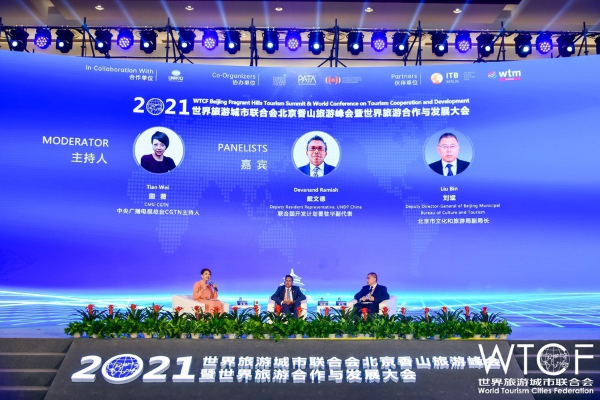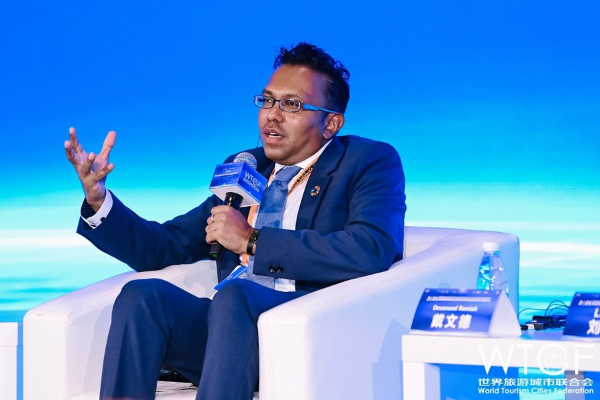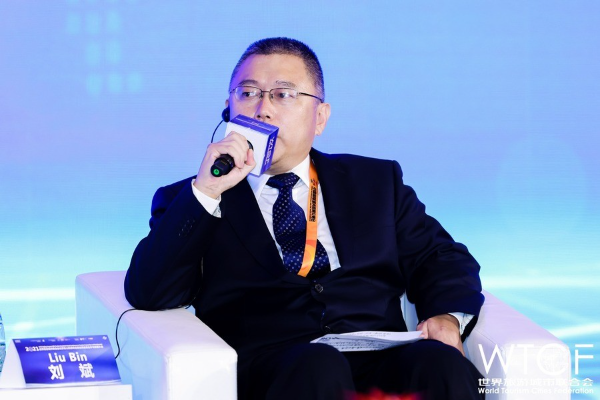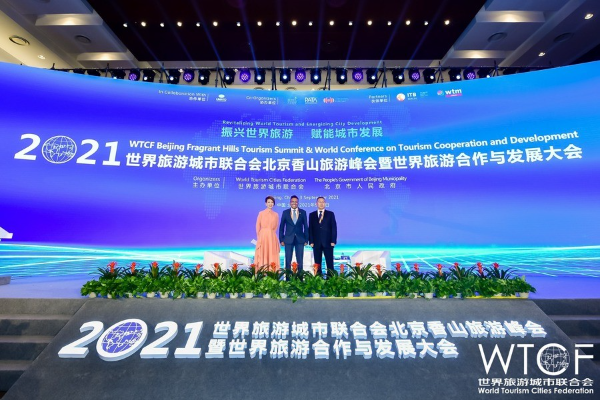Publish Time:2021-09-10 13:15:18Source:WTCF
【Introduction】:On 3 September 2021, WTCF Beijing Fragrant Hills Tourism Summit & World Conference on Tourism Cooperation and Development opened in China National Convention Center, Beijing. It was organized by the World Tourism Cities Federation (WTCF) and the People's Government of Beijing Municipality together with the world's major international organizations and tourism institutions.
On 3 September 2021, WTCF Beijing Fragrant Hills Tourism Summit & World Conference on Tourism Cooperation and Development opened in China National Convention Center, Beijing. It was organized by the World Tourism Cities Federation (WTCF) and the People's Government of Beijing Municipality together with the world's major international organizations and tourism institutions. The part of "Dialogue on Sustainable Development of Tourism Cities" was moderated by Tian Wei, a CCTV-CGTN host. Devanand Ramiah, Deputy Resident Representative of UNDP China, and Liu Bin, Deputy Director-General of Beijing Municipal Bureau of Culture and Tourism, shared experience of China's tourism cities on vigorously fulfilling the Sustainable Development Goals (SDGs) and provided insight into the sustainable development of global tourism cities.

"Dialogue on Sustainable Development of Tourism Cities"
Regarding the 2030 SDGs, Devanand Ramiah noted: "SDGs are actually the world’s biggest and most ambitious development framework. They are the grandest goal framework in the mankind's history". SDGs mean integrating society, economy and ecology, instead of focusing on GDP and economic growth only.

Devanand Ramiah, Deputy Resident Representative of UNDP China
Liu Bin pointed out the key to the specific SDGs of Beijing's tourism, "positive interaction among economy, society and ecology". He stressed that Beijing has always been promoting tourism development by adhering to four sustainable development concepts. First, development of tourism resources must be coordinated with their protection; Second, quality of tourism development must be coordinated with its development speed; Third, tourism development must be coordinated with the environmental carrying capacity; Fourth, economic value of tourism must be coordinated with ecological preservation.
When talking about Beijing's efforts to promote sustainable tourism development, Liu Bin stated Beijing's new overall city planning and its management of core areas highlight concepts of sustainable development. "An important part of the sustainable development concepts is that development cannot be pursued by sacrificing the environment. This is the focus of Beijing’s government in overall planning".

Liu Bin, Deputy Director-General of Beijing Municipal Bureau of Culture and Tourism
Later, Liu Bin shared some of Beijing's measures and experience of coordinating sustainable development with economic growth in tourism. Beijing's tourism is an irreplaceable part of its economic development, and the sector covers the whole service chain, including "food, accommodation, travel, transport, purchasing and entertainment". Services are offered by numerous SMEs and workers. Tourism development should provide more market opportunities for these SMEs and more job opportunities for these workers. From this perspective, tourism means a lot to both economic growth and social development.
Devanand Ramiah showed his agreement. He believed tourism can support development of SMEs and increase job opportunities. "UNDP has a project in Yunnan. Local women of the Yi nationality are good at weaving handicrafts. We worked together with them, to both protect the ethnic culture and increase their incomes. Tourism will benefit when they sell woven handicrafts on the market. The women could work while taking care of their families. Such sustainable employment is good for families and cultural protection".
In addition, Devanand Ramiah showed his views on how to balance ocean protection and tourism development. He believed tourism development should preserve nice natural scenery and that business activities cannot exert negative influences on the environment. This is of great significance for the sustainable development of the whole sector. "In the future, we must pursue sustainable tourism development, which will not only support industry growth but also contribute to environmental protection. Better environmental protection will attract more tourists. This is the balance we must try to strike".

Group Photo of Speakers and the Moderator
Devanand Ramiah also stressed that UNDP will establish partnerships with WTCF in China. They will jointly study and analyze sustainable development of cities, especially how tourism can contribute to sustainable development. "This is of great significance for us. It's a cooperative project we are all looking forward to. Research reports are expected to be released at the next WTCF conference". He is full of hope for future progress.
E-Mail Login|Contact Us|Careers|Legal disclaimer
世界旅游城市联合会版权所有 备案号:京ICP备19050424号-1
Our legal counselors: Beijing Jincheng Tongda & Neal Law Firm